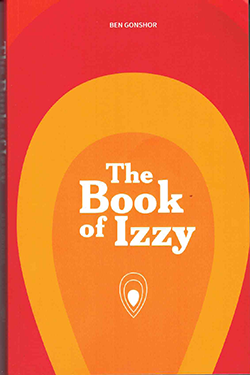The Book of Izzy by Ben Gonshor; Montreal, Canada: AOS Publishing (c) 2024; ISBN 9781990-496462; 324 pages; $17.92.

 SAN DIEGO — A would-be author, off his psychiatric medications and wandering between the worlds of the neurotypical and the schizophrenic, is so knowledgeable about Yiddish that he is invited to act in The Dybbuk, a well-known play by S. An-sky, which Izzy had memorized line-by-line years ago.
SAN DIEGO — A would-be author, off his psychiatric medications and wandering between the worlds of the neurotypical and the schizophrenic, is so knowledgeable about Yiddish that he is invited to act in The Dybbuk, a well-known play by S. An-sky, which Izzy had memorized line-by-line years ago.
Although steeped in Jewish folklore and mysticism, The Dybbuk is reminiscent of Shakespeare’s Romeo and Juliet in that two forbidden lovers both end up dead before the curtain falls.
The poor Torah scholar Khanan dies first, overcome by the news that Leah is betrothed to another, notwithstanding an agreement their fathers made that if one of them should have a son and the other a daughter, those children should be married to each other. Khanan’s angered by the betrayal, thereafter transforms into a dybbuk, an evil spirit, and takes possession of Leah’s body. Leah’s father, the rich merchant Sender, is put on trial for breaking the agreement, and following the beth din’s finding against him, an exorcism banishes Khanan from within Leah. However, she so desperately wants unity with him that she dies.
Playing Khanan and also stepping into the role of director, Izzy falls in love with Sue-Ann, who portrays Leah. At times brilliant and at times in la-la land, Izzy leads readers on a adventure through S. An-sky’s well-known, memorable play, and through his own disordered mind. Reality fades into dream sequences that sometimes are announced by a CHIRP sound that only Izzy hears. However, CHIRPs cannot be relied upon; sometimes the mental episodes start without warning. Readers follow Izzy to a coffee house, into a cemetery, to Sue-Ellen’s arms, and to the conclusion that life does indeed imitate art, and Izzy often cannot discern which is which.
Gonshor’s debut novel is brilliantly told. Yiddish phrases are utilized throughout the telling, and footnotes provide rough translations of the sense of them, if not their literal meanings. You come away with a nuanced understanding of The Dybbuk, insight into the experience of schizophrenia, and an increased Yiddish vocabulary. Three bargains in one book! But there’s also a drawback, the type is very small — so tiny that I had to have the publisher e-mail to me a PDF version (which could be magnified on my computer screen) in order to review it. For those with similar problems of eyesight, there is a Kindle version.
*
Donald H. Harrison is publisher and editor of San Diego Jewish World. He may be contacted via sdheritage@cox.net